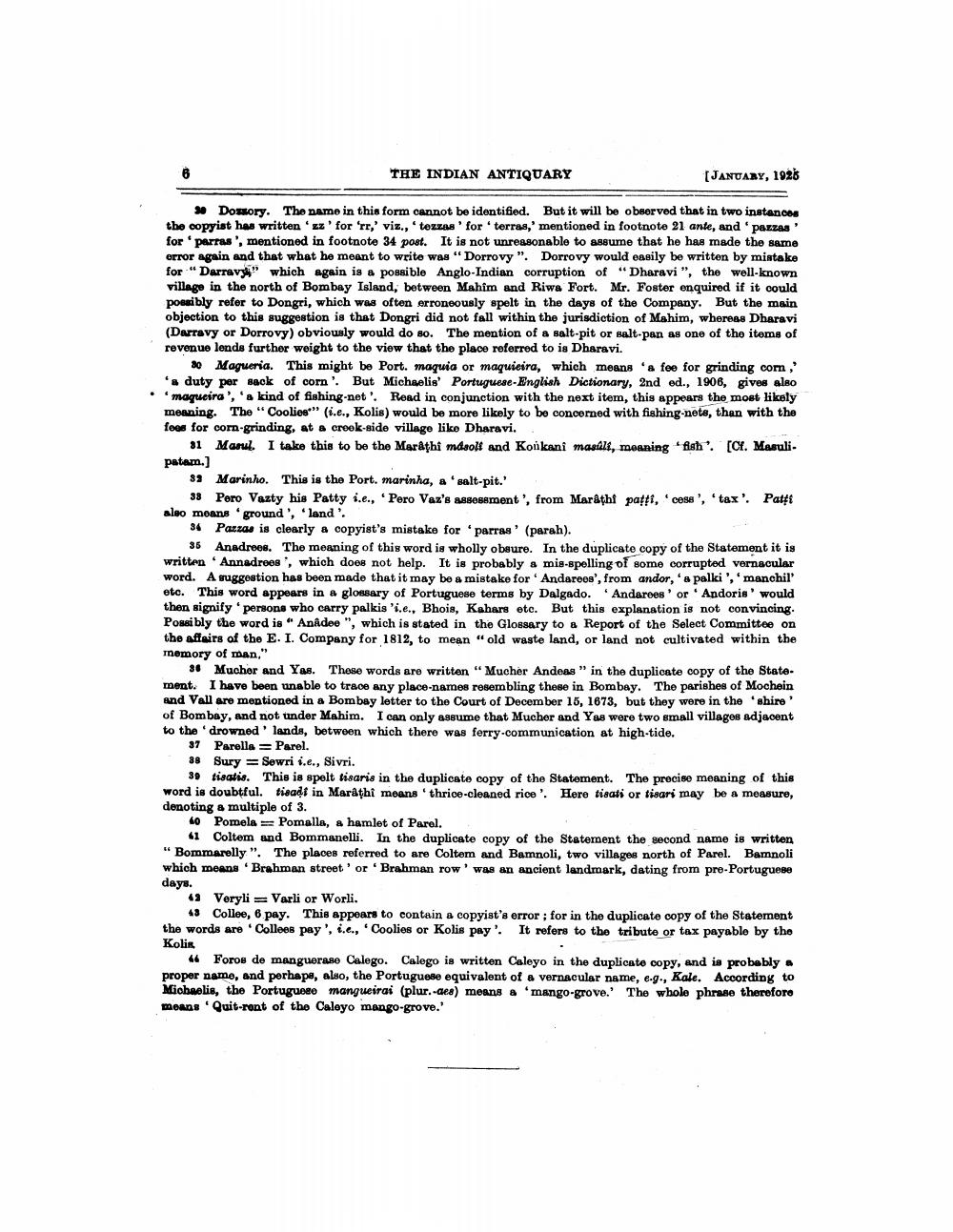________________
THE INDIAN ANTIQUARY
[JANUARY, 1925
» Domory. The name in this form cannot be identified. But it will be observed that in two instances the copyist has written 'zz' for 'rr,' viz., 'tezzas' for ' terras,' mentioned in footnote 21 ante, and pazzes for parras', mentioned in footnote 34 post. It is not unreasonable to assume that he has made the same error again and that what he meant to write was "Dorrovy ". Dorrovy would easily be written by mistake for "Derravy" which again is a possible Anglo-Indian corruption of " Dharavi ", the well-known village in the north of Bombay Island, between Mahim and Riwa Fort. Mr. Foster enquired if it could possibly refer to Dongri, which was often erroneously spelt in the days of the Company. But the main objection to this suggestion is that Dongri did not fall within the jurisdiction of Mahim, whereas Dharavi (Darravy or Dorrovy) obviously would do so. The mention of a salt-pit or salt-pan as one of the items of revenue lends further weight to the view that the place referred to is Dharavi.
20 Magueria. This might be Port. maquia or maquieira, which means a fee for grinding com, 's duty per sack of corn'. But Michaelis' Portuguese-English Dictionary, 2nd ed., 1906, gives also
magueira ', ' a kind of fishing-net'. Read in conjunction with the next item, this appears the most likely meaning. The "Coolies" (i.e., Kolis) would be more likely to be concerned with fishing-nets, than with the fees for corn-grinding, at a creek-side village like Dharavi.
31 Marul. I take this to be the Marathi mdsolt and Konkani masilt, meaning fish'. [C4. Masulipatam.]
33 Marinho. This is the Port. marinha, asalt-pit.'
38 Pero Vazty his Patty i.e., 'Pero Vaz's assessment', from Marathi patti, cesa, 'tax'. Patti aleo means 'ground', 'land'.
34 Pazzas is clearly & copyist's mistake for 'parras' (parah).
36 Anadrees. The meaning of this word is wholly obeure. In the duplicato copy of the Statement it is written 'Annadrees, which does not help. It is probably a mis-spelling of some corrupted vernacular word. A suggestion has been made that it may be a mistake for Andarees', from andor, ' a palki',' manchil' etc. This word appears in a glossary of Portuguese terms by Dalgado. "Andaroes' or 'Andoris' would then signify persons who carry palkis 'i.e., Bhois, Kahars etc. But this explanation is not convincing. Possibly the word is "Anadee", which is stated in the Glossary to a Report of the Select Committee on the affairs of the E. I. Company for 1812, to mean "old waste land, or land not cultivated within the memory of man."
86 Mucher and Yes. These words are written "Mucher Andeas " in the duplicate copy of the State. ment. I have been unable to trace any place-names resembling these in Bombay. The parishes of Mochein and Vall are mentioned in a Bombay letter to the Court of December 15, 1673, but they were in the shire of Bombay, and not under Mahim. I can only assume that Mucher and Yes were two small villages adjacent to the drowned lands, between which there was ferry-communication at high-tide.
87 Parella = Parel. 88 Sury = Sewri i.e., Sivri.
89 tisatis. This is spelt tisaris in the duplicate copy of the Statement. The precise meaning of this word is doubtful. tisadi in Marathi moans 'thrice-cleaned rice'. Here tisati or tisari may be a measure, denoting & multiple of 3.
40 Pomela = Pomalla, a hamlet of Parel.
41 Coltem and Bommanelli. In the duplicate copy of the Statement the second name is written "Bommarelly". The places referred to are Coltem and Bamnoli, two villages north of Parel. Bamnoli which means 'Brahman street' or 'Brahman row' was an ancient landmark, dating from pre-Portuguese days.
42 Veryli = Varli or Worli.
48 Collee, 6 pay. This appears to contain a copyist's error: for in the duplicate copy of the Statement the words are Collees pay', i.e., Coolies or Kolis pay'. It refers to the tribute or tax payable by the Kolik
46 Foros de manguerase Calego. Calogo is written Caleyo in the duplicate copy, and is probably proper name, and perhape, also, the Portuguese equivalent of a vernacular name, e.g., Kale. According to Mioboelie, the Portuguese mangueirai (plur.-dea) means a 'mango-grove.' The whole phrase therefore means 'Quit-ront of the Caleyo mango-grove.'




